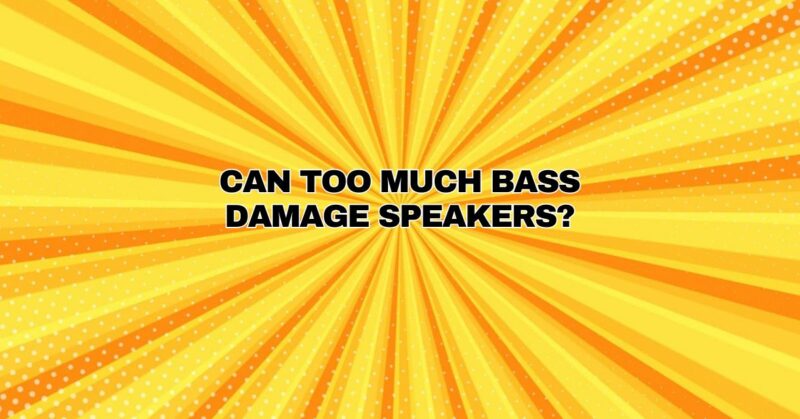Bass is an essential component of music, providing depth, power, and resonance. However, it’s not uncommon for enthusiasts and musicians to wonder whether cranking up the bass to extreme levels can harm their precious speakers. In this comprehensive guide, we’ll explore the relationship between excessive bass and potential speaker damage, offering insights into how to enjoy your low-end frequencies without causing harm.
Understanding Speaker Basics:
To grasp the potential risks of too much bass, it’s essential to understand the fundamentals of how speakers work:
- Cone Movement: Speakers produce sound by moving air through a diaphragm (usually a cone) when an electrical signal is applied to a voice coil. This movement generates sound waves, producing audible sound.
- Frequency Range: Speakers are designed to reproduce a specific range of frequencies, including bass, midrange, and treble. Bass speakers (woofers) are responsible for low-frequency sounds.
- Power Handling: Each speaker has a power handling rating, measured in watts (W), which indicates the maximum amount of electrical power it can handle before the risk of damage increases.
The Risks of Excessive Bass:
Excessive bass can potentially harm speakers in several ways:
- Overloading the Speaker: When you crank up the bass too high, you push the speaker beyond its intended limits. If the power delivered to the speaker exceeds its power handling capacity, the voice coil can overheat, leading to distortion or permanent damage.
- Mechanical Stress: High bass levels can cause the speaker’s diaphragm to move excessively. This can lead to mechanical stress on the speaker components, potentially resulting in tears or damage to the diaphragm, suspension, or voice coil.
- Clipping and Distortion: When a speaker receives more power than it can handle, it can enter a state of clipping, where the signal becomes distorted. Clipping generates harsh, distorted sound and can damage the speaker over time.
Preventing Speaker Damage:
To enjoy bass without risking speaker damage, consider these precautions:
- Match Amplifier and Speaker Ratings: Ensure that the amplifier’s power output matches the power handling capacity of your speakers. This helps prevent overloading the speakers with excessive power.
- Use High-Pass Filters: High-pass filters (HPF) can be employed to block ultra-low frequencies below the speaker’s capabilities. This prevents the speaker from attempting to reproduce infrasonic frequencies it can’t handle.
- Monitor Distortion: Be attentive to signs of distortion, which can indicate that the speaker is being pushed too hard. Reduce bass levels or overall volume if you hear distortion.
- Monitor Temperature: If a speaker becomes excessively hot during use, it’s a sign of stress. Allow it to cool down to prevent damage.
- Properly Size Subwoofers: For extreme bass enthusiasts, consider using dedicated subwoofers designed to handle low frequencies. This takes some of the strain off the main speakers, preventing them from being overtaxed.
- Room Acoustics: Room acoustics can impact bass performance. Proper room treatment can help achieve optimal bass response without pushing speakers to their limits.
Conclusion: Balancing the Boom
While bass is a vital and exhilarating part of music, it should be enjoyed responsibly to prevent potential damage to your speakers. By understanding the limits of your speakers, matching amplifier power, and monitoring for signs of distress, you can revel in the power of bass without risking harm to your audio equipment. Remember that responsible bass management not only safeguards your speakers but also ensures a more enjoyable and distortion-free listening experience.


